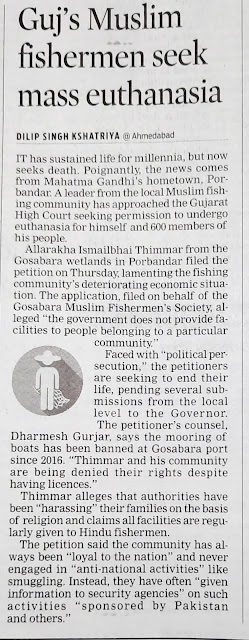When citizens seek death
‘Guj’s Muslim fishermen
seek mass euthanasia.’ The headline in today’s New Indian Express is
rather unnerving. The issue raises two questions. (1) Is the government meant
only for a particular community of people? (2) Can euthanasia be permitted?
Whose
India?
India has a Prime Minister who
revelled in making statements against a particular community while he was a
chief minister. When he became the PM, he stopped making such public utterances
which were not only crude but also subhuman. But his attitude towards that
community hasn’t undergone any improvement. In fact, he seems to think that
India is meant only for one particular community. Mr Modi loves to travel all
over the world and suggest solutions to international problems and
environmental disasters. But back home, he is as parochial as a dog in its
alley. This is the reason why the Muslim fishermen in Gujarat, Modi’s own
state, seek death. They know that their future is bleak as long as Modi’s party
remains in power. And the party will remain in power for quite some time, for
all we know.
The Modi
government has written off corporate loans amounting to eight lakh crores. That’s
a huge amount, undoubtedly. Very huge, in fact. In the same country where the affluent
people get such favours from Modi, poor people like farmers and fisherfolk are
driven to suicide by denial of survival supports. Long ago, I wrote in this
same space that Mr Modi’s strategy for eradicating poverty was eradication of
the poor. Who does Modi really care for? The question is worth asking again and
again. To whom does India belong under Modi’s pontificate?
Choose
one’s death?
Can people be allowed to
choose their death? I have written earlier in defence of euthanasia. I would
certainly like to choose my death when I realise that my further life is
pointless. I am a fervent supporter of euthanasia. But in the present case,
where a community of people ask for the right to kill themselves because they
are let down by their own government, there is something drastically wrong. It is
a clear and sad indicator of the government’s failure to look after its own citizens.
I won’t support that sort of euthanasia.
There are
many places where the poor are being neglected by both state and central
governments. Even Kerala which boasts of high standards of living has areas
where people live in abject poverty. Attappadi is one. Infant mortality rate in
that place of Adivasis is higher than the national average. The national infant
mortality rate is 27. What it means is out of every 1000 infants born in the
country 27 succumb to death before the age of one. Kerala’s infant mortality rate
is an enviable 6. But in Kerala’s Attappadi, the rate is 32. 
A pregnant woman being taken to hospital in Attappadi
What Kerala
is doing to the Adivasis of Attappadi is what Modi is doing to Muslims in the
country. Some people are driven to their deaths by their own governments! Is it
any wonder then if such people demand the right to die en masse?
We know that
no court is going to give any people the permission to embrace death as a
community. But the very demand made by the people should open the eyes of the
government to certain harsh and painful realities in the country.

Hari OM
ReplyDeleteWhat painful reading... and one would observe that this is not a request for euthanasia at all (which is mercy killing of an individual in severe pain and irreversible health condition with death as its end anyway). It is, instead, a plea for mass suicide (which is sacrifice of one's life as no other option for relief from mental agony appears available). If this community is serious about their request, they will go ahead anyway. The intent here, though, appears to be raising the matter to as large an audience as possible. It is a politically sound alert to government, and society in general, that conditions are in a parlous state for this group. One holds one's breath wondering how it could even have reached this stage and what, in fact, the court will say about it... YAM xx
A2Z Reflection
This request from the fisherfolk is a desperate means to draw the attention of the government to their miserable plight. Will the government care? What will the court do? I'm not quite optimistic.
DeleteWonder if their dying throes of pain will ever be heard by the political who's who. Tragic state of affairs. Ethnic cleansing.
ReplyDeleteYes, ethnic cleansing is happening though slowly and deviously.
DeleteWhat a world, cheering up the sweet- talker politicians and give them credit on the world stages, not really caring for what gruesome life tragedies they send people under their administration like mass suicide. In Kerala, the rulers take regular flights to the developed nation to get better treatments leaving the children of the people pushed to live in dismal facilities to die. What a Shame!!
ReplyDeleteUtter shame indeed. Our leaders are like vampires feeding on our blood.
Delete